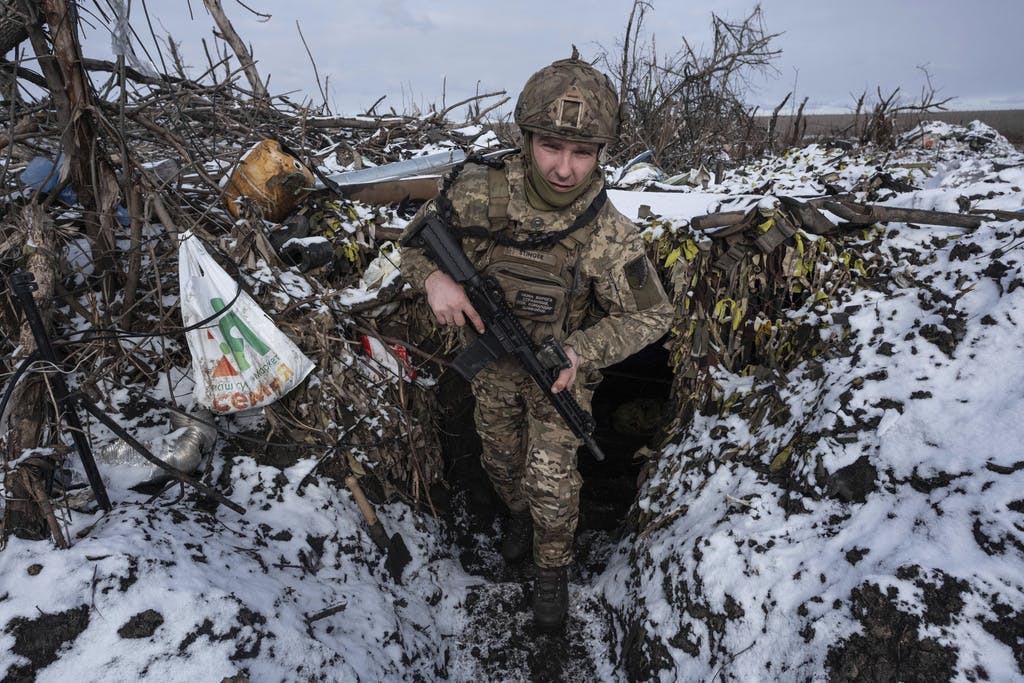New Poll Shows Europeans’ Striking Pessimism About Ukraine’s Prospects for Prevailing Against Russia
Despite the recent passage of an aid package for Kyiv, the public’s mood is gloomy — and, as the third year of war looms, could prod EU leaders to think outside the box.

Ukrainian soldiers may be manning the front lines, but more Europeans seem to be manning their nearest café tables and shrugging off expectations that Ukraine can prevail over Russia, a new poll finds.
The survey, conducted by the European Council on Foreign Relations and released just ahead of the second anniversary of Russia’s invasion of Ukraine, finds that 10 percent of Europeans, on average, believe Ukraine will emerge the winner in the conflict. The prevailing view, in all 12 surveyed member states, is that a “compromise settlement” will end the war.
According to the survey’s authors, this shift of opinion from last year was driven by the stalled counteroffensive of the Ukrainian military coupled with concerns about a possible American policy shift and what a re-election of President Trump could indicate for the war. The so-called Trump effect on global politics already appears to be influencing perceptions, even before confirmation that the former American president will be able to lead a campaign to return to the White House.
Yet, the cloud of pessimism does not necessarily mean that support for Kyiv has diminished. Another of the poll’s findings was that Europeans increasingly see the war in Ukraine as a “European” conflict, for which they have primary responsibility. In the event of an American policy pivot, particularly should Mr. Trump win the presidency, a majority of respondents believe Europe should either maintain or even increase its level of support for Kyiv.
Significantly, the survey, titled “Wars and Elections: How European leaders can maintain public support for Ukraine,” finds that a majority of Europeans are not in the mood for appeasement. The study’s authors proffer that, to maintain public support for Ukraine, EU leaders should put forward a narrative that is “rooted in reality” and establishes a distinction between a “negotiated peace” and a “peace on Russia’s terms.” That means framing the debate to define what peace means.
It also means that EU leaders will likely need to change their pitch so as not to come across as unrealistic to an increasingly skeptical, or simply weary, public. The survey finds that support for Kyiv among some of its neighbors, including Poland, has started to wane, against opinion in countries further afield, like Portugal and France, where support appears surprisingly firm.
Some 20 percent of those surveyed from Austria, France, Germany, Greece, Hungary, Italy, the Netherlands, Poland, Portugal, Romania, Spain, and Sweden predict a Russian victory. Ebbing confidence in the Ukrainian war effort is visible across the continent and even in the most optimistic member states surveyed — Poland, Sweden, and Portugal — fewer than one in five believe Kyiv can prevail.
Among those three countries, though, there is a preference for supporting Ukraine in fighting to regain its territory — 50 percent, 48 percent, and 47 percent, respectively. By contrast, in Italy, Hungary, Greece, Romania, and Austria, there was a majority preference for pushing Kyiv to accept some kind of settlement. Elsewhere, the public is more divided. In Germany, 32 percent of those polled say Ukraine should keep fighting back, whereas 41 percent say a negotiated settlement is the way forward.
One of the things that the poll did not significantly address is the economic fallout of the war. Here again, public opinion is likely to be uneven. On the one hand, the head of the German Institute for Economic Research told the Rheinische Post that “the economic costs for Germany after two years of war in Ukraine are likely to be significantly higher than 200 billion euros.” That comes amid news that the German economy is shrinking.
On the other hand, little Denmark is going to be sending all of its artillery to Ukraine. So this picture is anything but static. In the run-up to European parliamentary elections in June, there will be much more on politicians’ plates than croissants and café au lait.

